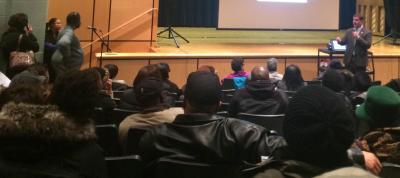January 8, 2015
 Mayor Walsh fields questions at Mattapan meeting on Tuesday night: Photo by Lauren Dezenski
Mayor Walsh fields questions at Mattapan meeting on Tuesday night: Photo by Lauren Dezenski
Mayor Martin Walsh stayed around at the Mildred Avenue Community Center Tuesday night to answer community members’ questions over a proposal to site treatment facilities off River Street for those who have been displaced by the closing of the Long Island Bridge.
The latest plan had been updated after a contentious community meeting in late November that left community members and local elected officials screaming for answers from the city.
“This meeting probably should have happened long before this,” Walsh told the crowd of more than 150. “We did it wrong. The elected officials all called me in.”
The city is renovating Building N on the Boston Public Health Commission’s Mattapan Campus off River Street to house a transitions program and a re-entry program that would bring up to 75 people to the facility. “I hear what you’re saying,” Walsh said. “We’re looking at this site because it’s an emergency situation.”
The transitions program will occupy the first two floors of the three-floor building, offering 30-day stabilization for up to 45 men and women in early recovery. Individuals must be referred by another agency and must remain drug-free to stay at the location. The Wyman Re-Entry Program, housed on the third floor, will be a 90-day recovery program for up to 30 men transitioning from correctional facilities back into the community. The re-entry program is an important middle step between detox and a halfway house, Walsh said.
Flanked by officials from the Boston Public Health Commission, the mayor repeatedly vouched for the benefit of these programs, and said that neither program constitutes a walk-in homeless shelter.
“The longer these people stay in transitions programs, the fewer will be on the streets,” Walsh said. “I know it’s hard to hear and listen to, but for some of us, if we didn’t have recovery program to go to, we wouldn’t be able to turn our lives around and run for mayor of the city of Boston.”
Community members voiced concerns about safety and many were dissatisfied with the process that expedited the facility without much community input.
“I was initially concerned how it was going to be a controlled environment, but I understand now it is going to be a controlled environment,” said community member Helen Mayo. Her home borders the BPHC property. “I hope the city will follow through with its promises.”
Another member of the audience, a man who said he has lived in Dorchester and Mattapan for the last 40 years, demanded construction on the facility stop until the community can fully vet the proposal. To which Walsh replied: “No matter what program it is, something will go there. We’re upgrading the building regardless.”
Walsh and BPHC representatives emphasized that those at the facility would be strictly monitored by the program, only allowed outside on the BPHC grounds under staff supervision, with staffing around the clock. The building itself would be secure, video-monitored, and alarmed, patrolled by officers both inside and outside. Security will also escort clients off campus as needed to public transportation and appointments outside of the neighborhood and work closely with BPD to address neighborhood security concerns.
Walsh addressed security issues bluntly: “If there’s a major problem at this facility, I’ll shut it down.”
Meanwhile, the city will be exploring whether it can grow the recently proposed Southampton Street facility, converting a former city transportation building on Southampton Street into a permanent homeless shelter. The building – which will not be ready for occupancy until next spring – will reportedly house as many as 490 people when completed.
Walsh will meet with elected officials later this week, including City Councillors Tim McCarthy and Charles Yancey, state Representatives Russell Holmes and Dan Cullinane, and state Senators Sonia Chang-Diaz and Linda Dorcena Forry, all of whom attended Tuesday’s meeting. He also agreed to ensure that the BPHC community advisory board that oversees the property, which has become largely defunct in recent years, will be reinstated.
In response to community concerns, BPHC will also host a community meeting on Mon., Jan. 26, regarding the EMS facilities that are sited on the Mattapan campus.
Villages:
Topics:


